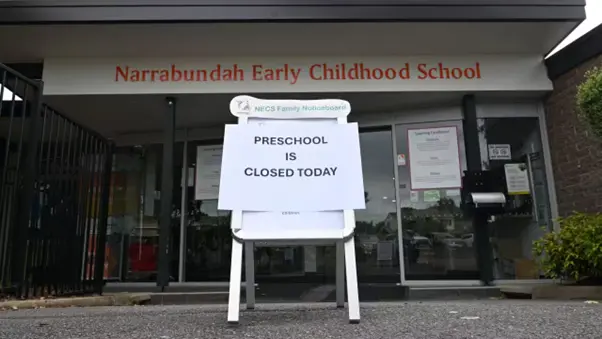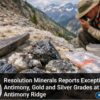Dozens of Canberra schools reopened Tuesday following an unprecedented shutdown sparked by asbestos contamination in children’s craft sand. The ACT education directorate confirmed 51 schools would operate on 18 November, though 25 remain closed while cleanup continues.
The crisis, which saw 70 public schools shut on Monday, represents one of the largest school closures in ACT history outside of pandemic lockdowns.
From 16 to 70: How the Crisis Escalated
What began as a precautionary closure of 16 schools on Friday, 14 November quickly spiralled into a territory-wide emergency. The Australian Competition and Consumer Commission (ACCC) initially recalled three decorative sand products after detecting chrysotile asbestos in laboratory tests.
By Sunday evening, Kmart and Target had issued voluntary recalls for additional products. An audit revealed the contaminated sand was “widespread” across ACT public schools.
ACT Education Minister Yvette Berry announced the expanded closures late Sunday:
“Unfortunately, these sand products are even more widely used in our schools than the Officeworks products. That means while we would have been able to reopen many schools from Friday, we are now in a position that we need to close additional schools.”

Yvette Simone Berry, Deputy Chief Minister of the Australian Capital Territory
The Contaminated Products
Multiple coloured sand products have been recalled after testing positive for asbestos traces:
- Kadink Decorative Sand (10g tubes, 6-pack)
- Kadink Sand (1.3kg)
- Educational Colours Rainbow Sand (1.3kg)
- Creatistics Coloured Sand (1kg)
The products were manufactured in China and sold throughout Australia since 2020. They were stocked by major retailers including Officeworks, Kmart, Target, Educating Kids, Modern Teaching Aids, and Zart Art.
Laboratory testing detected two types of naturally occurring asbestos:
- Chrysotile (white asbestos)
- Tremolite (one of six types of asbestos)
The most dangerous form, crocidolite (blue asbestos), has not been detected.
Tuesday’s Reopening: A Partial Return
As of Tuesday, 18 November, the situation across ACT public schools stands at:
- 51 schools open (with 42 operating relocated classes or closed rooms)
- 25 schools remain fully closed
- 16 schools partially open with specific year groups only
Schools could only reopen after receiving clearance certificates from licensed asbestos assessors. The education directorate worked through the weekend conducting visual inspections, air testing, and remediation where needed.
WorkSafe ACT confirmed all air quality tests at schools have returned negative for airborne asbestos fibres.
Why Only ACT Took This Action
The ACT government’s decision to close schools differs markedly from other Australian jurisdictions. No other state or territory closed schools despite the nationwide product recall.
NSW and Victorian education departments issued safety alerts instructing schools to remove the products but maintained operations. Catholic and independent schools in the ACT also remained open while managing the issue internally.
ACT Education Directorate Director-General Jo Wood defended the closures during a Legislative Assembly hearing, stating the territory’s asbestos legislation is “much tighter than other jurisdictions.”
Minister Berry emphasised the government’s legal obligations:
“The ACT has strong work health and safety laws, and we are required to eliminate risk as much as reasonably practicable. For asbestos, that means isolating the space, testing and remediating. All required to be done by licensed asbestos contractors.”
Health Risk Assessment
WorkSafe ACT commissioner Jacqueline Agius stressed the risk to students and staff remains “very low.”
Health officials have confirmed:
- No clinical assessments recommended for people who contacted the sand
- Asbestos fibres unlikely to become airborne unless sand is crushed or pulverised by mechanical means
- The sand was typically used in contained activities like craft tables and sensory play
The Education Directorate reported the sand was used in various settings:
- Trays on desks
- Open plan areas
- Outdoor sensory zones
The Broader National Picture
While ACT schools bore the brunt of closures, the contamination issue extends nationwide. More than 80 retailers stocked at least one affected product across Australia.
In South Australia, the Kadink Sand was identified at more than 100 sites. The state government is assisting with safe removal but has not closed schools.
One Brisbane school, Mancel College, closed briefly on Friday after discovering the product but reopened quickly.
Safe Disposal Guidelines
The federal government’s Asbestos and Silica Safety and Eradication Agency issued urgent guidance for households with affected products:
- Stop using the sand immediately
- Wear disposable gloves, P2-rated face mask, and protective eyewear
- Do not disturb the product to prevent fibres becoming airborne
- Double wrap in 200-micron plastic bags and seal securely with tape
- Label clearly as asbestos-containing material
- Do NOT dispose in general household bins
- Contact specialised asbestos removal facilities
Retailers are offering refunds for recalled products.
Impact on Families and Schools
The sudden closures disrupted thousands of families, many learning about shutdowns only at school drop-off. Some parents were not notified until arriving at campus gates.
Education staff were given options including taking leave, working from home, or relocating to third locations. The directorate is considering additional leave provisions for impacted employees.
SES volunteers were called in to assist with visual inspections across dozens of campuses.
Minister Berry acknowledged the significant disruption, particularly occurring near the end of the school year when families typically have celebrations and commitments planned.
Also Read: BlueScope Contractor Killed in Steel Beam Tragedy at Port Kembla Steelworks
What Happens Next
Remediation work continues at the 25 schools remaining closed. Licensed asbestos contractors are conducting detailed testing and cleanup operations, which Minister Berry warned could “take days” to complete.
The education directorate maintains a hotline (13 22 81) for queries and is updating families via email as assessments progress.
Schools require clearance certificates from licensed assessors before reopening to students and staff.

ACT Schools shutdown amid asbestos decontamination work
The crisis has reignited memories of the ACT’s “Mr Fluffy” asbestos homes scandal, where approximately 1,000 homes contained dangerous loose-fill asbestos insulation installed in the 1970s.
For now, thousands of ACT families navigate the uncertainty while authorities work to ensure every school is safe for learning to resume.












